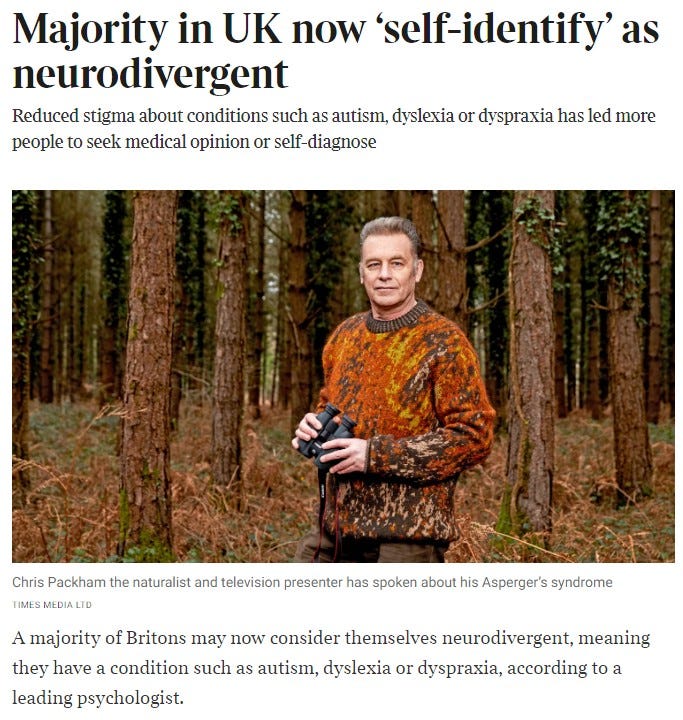"Aren't We All Neurodivergent?"
What the heck does neurodiversity mean anymore?
I just came across this article in The Times (UK publication) in which Francesca Happé— a professor of cognitive neuroscience at King’s College London— argues that reduced stigma around mental disorders has led more people to seek medical diagnosis and to self-diagnose. She says,
“Once you take autism, ADHD, dyslexia, dyspraxia and all the other ways that you can developmentally be different from the typical, you actually don’t get many typical people left. That is going to change society, but not in a bad way.”
The article then quotes an “unnamed clinician” in saying “I’d call a child a zebra if it got them the services they needed.”
OK look— I agree the reduced stigma is a great thing. For adults, it can be immensely empowering to discover later in life who you truly are and to identify positively with the neurodivergent label. I also think increased diagnoses of things like autism, ADHD, dyslexia, etc. is largely an indication that there is a reduced stigma and is also a net positive in allowing lots of students who need the labels for support to help them flourish in school and beyond.
I do think that all of us have some extreme trait (above or below 2 standard deviations from the mean) and are “neurodivergent” on that trait. No one scores average across the board on every single personality or ability dimension. But does that make all of us “neurodivergent”? Good question!
I’m still wrestling with this. Traditionally, the term “neurodivergent” has referred to a particular set of neurodevelopmental “disorders”— mainly autism which requires a clinical diagnosis. The term has expanded over the years to include things like ADHD and dyslexia but doesn’t include just any personality trait. Are extreme introverts neurodivergent? What about someone with incredible artistic skill or athletic prowess? Are they neurodivergent? Why or why not? I don’t have the answers, just have a lot of questions I’m thinking this through with you all.
Something I do see troubling is this TikTok trend for teenagers to self-diagnosis themselves with all sort of clinical diagnoses without any actual formal evaluation. I recognize that some people see no problem with this, and even see this is as a wonderful thing. I’m not one of those people.
For one, all developmental disorders are really on a continuum because we’re all human. It’s very easy to see yourself somewhere in any of the diagnoses because all people with whatever label are part of humanity. Take a really controversial trait— psychopathy. Everyone loves to completely divorce themselves from this trait and point to someone else in their life they don’t like who is “such a psychopath”. But I assure you that you exhibit psychopathic behaviors every now and then. Yea sure, this probably doesn’t mean you are a certified psychopath (by Robert Hare’s definition), but if you’re really honest with yourself you can identify times you can resonate with such behaviors (oh, you’ve never lied to get what you want? You’ve never gotten a thrill at someone else’s pain? Really?).
Taking this analogy, a lot of young people who feel isolated and awkward may hear about a few traits of autism, for instance, and immediately jump on the identity “I am autistic!”. In reality, you’re probably just human and can be awkward sometimes but that doesn’t mean you actually score high in autism and need resources and support. In fact, your self-diagnoses and demand for resources takes away from the support and limited resources of those who truly need it.
Which brings me to another reason I see this trend as problematic: I’m seeing a concerning trend for teenagers to feel peer pressure to identify with their victimhood. In my view, this is pretty disempowering. I think youth on social media know they are more likely to get attention and likes for “coming out as neurodivergent”. I don’t think it’s great that you are identifying with the neurodivergent label primarily so you can “fit in” and “belong” among your peer group. That actually feels pretty antithetical to the whole neurodivergent thing!
I say all this as someone who is a long-time advocate of the neurodiversity movement and even wrote a book for educators about this. If you know me at all, you know I am a neurodiversity advocate! I think an increase in people embracing the neurodiversity label can help lots of people not feel so much shame for being so damn different from others.
But a question I get a lot is: “But no one is normal, right?” Let me answer this directly and honestly: No, not everyone feels like their everyday cognitions and emotions are extremely divergent from how most people tend to think and act in everyday social situations. Personally, I feel like at most “networking events” or social parties I am invited to where I am meeting new people, I spend an inordinate amount of effort just trying to appear “normal”. I have so many divergent thoughts going through my head that I know would be totally inappropriate to ask the other person (one of my closest friends thinks my interior monologue is similar to Larry David’s). I have hardly any filter in my head which a lot of my friends find funny and endearing but for people who don’t me at all they can be offended by the things I am thinking. I have an almost tic-like need to tell the truth and be authentic which I feel like I have to inhibit all the time.
Now, I have often have wondered: Is everyone like this? Is it normal to not be normal inside but to try hard to appear normal in new social situations? Are we ALL just pretending? Well, I’ve talked to people and asked them this question and I discovered that actually NO NOT EVERYONE CONSTANTLY THINKS DIVERGENTLY. There really are societal "norms" of behavior that most people seem to intuitively “get” and feel perfectly comfortable adhering to. I think it means something to say that there are certain ways of thinking and behaving that are considered more "normal" in everyday society than others.
To be clear, I don’t think neurodivergent people are superior in any way for the way their brain is wired. In fact, I hate it when people claim the neurodivergent label to make themselves feel super special and to get social attention. For many people it’s just who they are and it takes a lot of work and effort for them to be “normal enough” in everyday life where people don’t look at them like they’re crazy.
So let me return to the initial question “Aren’t we all neurodivergent?” Well in a certain sense yes we are. We all have some extreme aspect of our personality structure. Very true! But I worry that if everyone becomes neurodivergent the term will lose all meaning entirely. I’m all for expanding the identity to include lots of other things we don’t currently include, but I am honestly wary about losing a central meaning of the term: That the way your brain is wired is extreme enough on a certain socially-relevant or education-relevant dimension that it’s really difficult to navigate the ordinary world of humans or to learn in a standardized way.
I tried to keep it as real as I could in this post and feel a bit vulnerable saying all this but wanna open a really authentic dialogue about this because it’s clear there is a trend for everyone and their Mother to suddenly become neurodivergent. Let me know what you think in the comments because I truly care about hearing multiple perspectives. I know, that’s so neurodivergent of me. :)




Scott, thanks for putting words to the knot so many of us are wrestling with — how to celebrate neural variety without diluting the very signal that unlocks real-world support.
Where your argument really resonates:
If every quirk becomes a clinical badge, HR budgets and public-school IEP funding will evaporate; labels lose their power to trigger accommodations.
Reduced stigma is a gift. Late-diagnosed adults I coach often say the label finally let them swap “What’s wrong with me?” for “How do I work with my wiring?”Where my work in companies adds a nuance:
Trait × Context = Impairment. An ADHD engineer in a flow-friendly scrum team may need zero formal supports; the same brain in an open-plan help-desk can burn out in a week. Severity isn’t just biological, it’s environmental.
Self-diagnosis alone rarely unlocks anything at work—legal accommodation processes still hinge on formal evaluation—yet many gifted/ND adults hesitate to disclose at all. We often coach them out of internalised ableism, not victim-performance.
What keeps the term useful is tying it to design levers, not identity politics.
Universal tweaks everyone loves (clear agendas, camera-optional meetings) + opt-in personal adjustments (noise-cancelling stipend) = no one has to prove they’re “ND enough” for basic humanity, while resources remain targeted.
So maybe the next evolution is: “We’re all neurologically unique; some of us need system tweaks to hit the same outcomes.” That keeps the label actionable while honouring the spectrum within the spectrum.
Would love your thoughts on how this trait-context framing might translate in education settings, where the resource crunch is even sharper. Always appreciate your willingness to tackle the messy middle ground.
Scott, love this essay. It gives voice to concerns I have as a clinician. Nick Haslam's idea of Concept Creep speaks to what you are pointing at too.